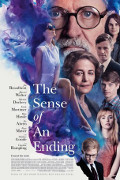
Directed by
Ritesh Batra
108 minutes
Rated M
Reviewed by
Bernard Hemingway

The Sense Of An Ending
Synopsis: Tony Webster (Jim Broadbent/Billy Howle), a divorced retiree, lives a quiet life running a small vintage camera shop. He is still on good terms with his ex-wife Margaret (Harriet Walter) snd between them they have a grown-up daughter, Susie (Michelle Dockery), who is heavily pregnant. One day he receives a solicitor’s letter informing him that he has been left a bequest by the mother of his first girlfriend, Veronica (played in the past by Freya Mavor and in present by Charlotte Rampling). It turns out to be a diary but Veronica is unwilling to let him have it.
I haven’t read the 2011 Booker-winning novel by Julian Barnes on which Ritesh Batra’s film is based so I cannot tell if it does justice to its source material but in itself The Sense of an Ending is an easily likeable film that is tailored to exactly the same demographic as that of its lead characters – comfortable middle-class superannuants. Batra,who had a modest hit with his Mumbai-set feel-gooder for seniors, The Lunchbox in 2013, gives us an attractively packaged story set largely in North London’s leafy suburbs and, in its flashbacks to the 1960s, shifting between an idyllic ivy-covered county home and the wood-panelled halls of a posh private school. Despite its tragic core, seen via the wrong-end-of-the-telescope point of view of Jim Broadbent’s Tony, it never raises it temper, its characters, with the exception of Rampling;s Veronica, never seeming more than somewhat bemused by life’s unfairness. The retrained tenor of the film is announced in Tony’s reflective opening voice-over in which he describes life as a series of holding patterns, each one supplanting the other, each one replacing the unfulfilled promise of its predecessor with a new set of expectations that in turn will remain unrealized and so on. The Sense of an Ending, is on other words, a very English film.
If you’ve seen Broadbent in films such as Roger Michell’s Le Week-End (2013) or Mike Leigh’s Another Year (2011) you'll know exactly what to expect here. He is no leading man but he is a superlative character actor and he brings just the right measure of frustration and resignation, abrasiveness and remorse to his grumpy old man character. Tony is well-satisfied with his routine life, his little camera shop that he runs as a hobby (he never sells or repairs anything), his occasional bantering interactions with his ex-wife and his casually paternal relationship with his daughter (his participation as a stand-in partner at her pre-natal clinic seems a little far-fetched).
Barnes’s original idea of a unattainable bequest is a clever device to open up Tony’s hitherto sealed past and have it infuse his present behaviour as he sets about getting what he believes is his by rights. This leads to a good deal of genial comedy as Tony firstly tracks down Veronica then tries to work out what her game is, all the while recalling moments from their shared past. As it turns out she is playing no game and this leads us to the film’s big reveal and, more seriously for Tony, a reminder of his unkindness (albeit enacted in the anger of disappointed love) many years ago. While we're on the subject, don't get your expectations for Rampling too high, her part although effective, is actually quite small.
Whilst all that has gone before is eminently watchable it is at this point one feels that the film could have been better (as is, presumably, the novel). Given Tony’s re-animation at the idea of seeing Veronica again (sarcastically derided by Margaret in an amusing scene) one would think that the letter she gives back to him at the film’s end would have crushed him but the consequence seems to amount to no more than the philosophical reflection that we heard opening the film. The reveal too is somewhat opaquely handled. This is over and above Barnes’s allusion with his novel’s title to the 1967 work of the same name by literary scholar, Frank Kermode, in which he challenged the idea of clear endings and clear meanings in literature or life. I wholeheartedly concur with the sentiment but there is an considerable difference between ambiguity and simply leaving out bits of the narrative. Given that Emily Mortimer plays Veronica’s mother one surmises that her part was originally bigger than what has ended up on screen. If not, an unknown actress would have been better cast.
These flaws aren’t fatal and aside from a clumsily filmed scene between Tony and Margaret in a café the film is consistently enjoyable, it being no big deal to fill in the gaps that Batra has left. If there is one persistent weakness however it is that there is no continuity between the two versions of Veronica and Tony. This is not just about a lack of physical resemblance, of which there is none, Howle and Mavor being conventionally good-looking young people, but there is no sense of them being the same people in terms of personality, demeanour and behaviour, the toll of the years notwithstanding. As we switch back and forth between the two time frames it’s like watching two different films spliced together. Some work in trying to bridge the gap here would have helped considerably.
Despite this, The Sense of an Ending is the sort of film that for its designated audience will largely bypass criticism. It’s rather like a reassuring mug of cocoa on a wet Sunday afternoon. Who’s going to grumble about that?

Want more about this film?


Want something different?




